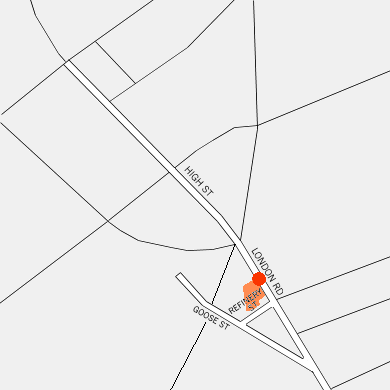1864-1885 VICTORIA SUGAR REFINERY

1864-1885 VICTORIA SUGAR REFINERY

NEWCASTLE-UNDER-LYMECLICK the (For local directory of sugar houses, click here.) (For national directory of sugar houses, click here.)
The width of this map represents 740yds / 625m. |

|
**************************************
|
Sugar refining was never plain sailing and most refineries had their problems, but this one in Newcastle-under-Lyme appears to have had a running battle with the local Council throughout its years of operation and I think it fair to say that its closure had little to do with the finances of refining but much to do with public health and local politics. The 1871 census shows Abington as employing 35 men and women, some of whom are listed ... |
| BROMLEY | James | of Bridgemere | age 47 - boiler | 17 May St |
| CLINE | John | of Prussia | age 30 - labourer | 47 Penkhull St |
| COOPER | William | of Newcastle | age 28 - labourer | 45 Goose St |
| GERKEN | Lutge | of Hanover | age 47 - boiler | 2 Roebuck Lane |
| GERKEN | Lutge | of Mdx | age 19 - boiler's assistant | 2 Roebuck Lane |
| HALL | Charles | of Newcastle | age 54 - stoker | 24 Wilson St |
| HARRIS | George | of Newcastle | age 15 - labourer | 9 Bagnall St |
| HICKMAN | Richard | of Newcastle | age 14 - boiler | 1 Foden St |
| ILLIDGE | Robert | of Newcastle | age 46 - labourer | 2 John St |
| LEECH | George | of Newcastle | age 29 - labourer | 26 Bow St |
| MELCHER | Lutge | of Hanover | age 44 - labourer | 2 Roebuck Lane |
| MYATT | Thomas | of Whitmore | age 19 - labourer | 13 Union St |
| POTT | Joseph | of Cheshire | age 52 - night watchman | Black Horse, Ironmarket |
| TERRY | Frederick | of Kent | age 21 - boiler | 1 London Rd |
| THOMPSON | George | of Newcastle | age 49 - packer | 53 Upper Green |
|
In 1872 William Bostock, a Liverpool refiner, became a partner in the refinery and it began trading as Bostock & Abington and probably produced brewer's sugar. The 1881 census lists some of the 70+ employees ... |
| ABINGTON | Leonard J | of Staffs | age 56 - refiner/owner | 25 Lower Tean Rd, Checkley |
| BANKS | George | of Staffs | age 46 - labourer | 22 Shaw St |
| BARNES | Thomas | of Staffs | age 47 - boiler | 46 Hassells St |
| BLOOR | Henry | of Staffs | age 27 - labourer | 20 Harrison St |
| FUGE | Edward | of Wilts | age 47 - commercial traveller | 18 Bagnall St |
| GERKEN | Tietje (reads Firege) | of London | age 28 - boiler | 11 Goose St |
| GERKEN | Lutge | of London | age 29 - boiler | 5 London Rd, George Inn |
| GUMBLEY | Thomas | of Staffs | age 59 - labourer | 30 London Rd |
| ILLIDGE | Robert E | of Staffs | age 56 - refiner | 11 John St |
| KENNERLEY | George | of Cheshire | age 35 - packer | 7 Harrison St |
| LAWTON | Thomas | of Staffs | age 33 - time keeper | 11 Legge St |
| MARTIN | George W | of Southampton | age 25 - commercial traveller | 21 West Brampton |
| PATRICK | Charles | of Staffs | age 17 - labourer | 24 Bow St |
| ROBERTS | John Wm | of London | age 29 - labourer | 30 Castle St |
| ROWLANDS | Augustus | of Staffs | age 47 - labourer | 20 Harrison St |
|
In 1882, the firm provided the workforce with a supper at the Borough Arms Hotel. The firm was expanding, was prosperous and in a "present satisfactory and cheering condition", and, providing the Council was reasonable in its demands, would grow and be helpful to the town. However an inspection a few days earlier had found problems yet again ... refuse in a field, stench from the charcoal plant and a still smoking chimney. Even with these things rectified the complaints continued during that year ... "a most extraordinary amount of noisome steam and vapour had been emitted from the refinery .... filling the whole of London Road in the early morning with a most sickly and offensive stench" and later "the road .... between 6 and 7 o'clock was filled with dense steam coming from the works - the stench from which was insufferable". Money was spent but things did not appear to get any better and when in 1883 the refinery was issued with a summons regarding the polluting of a nearby brook, Abington had had enough and moved to Bristol. |
| Sources: * 'History of Commerce in Stoke on Trent' website. * GRO. * "The Victoria Sugar Refinery, Newcastle under Lyme (1864-1885)" by D. W. Adams, Newcastle under Lyme Library. * "A German Immigrant to Liverpool" by Pam Baker, AGFHS Mitteilungsblatt 86, 2008. [My thanks to Barbara Forbes & Pam Baker for their help with this page.] |
|
|
|